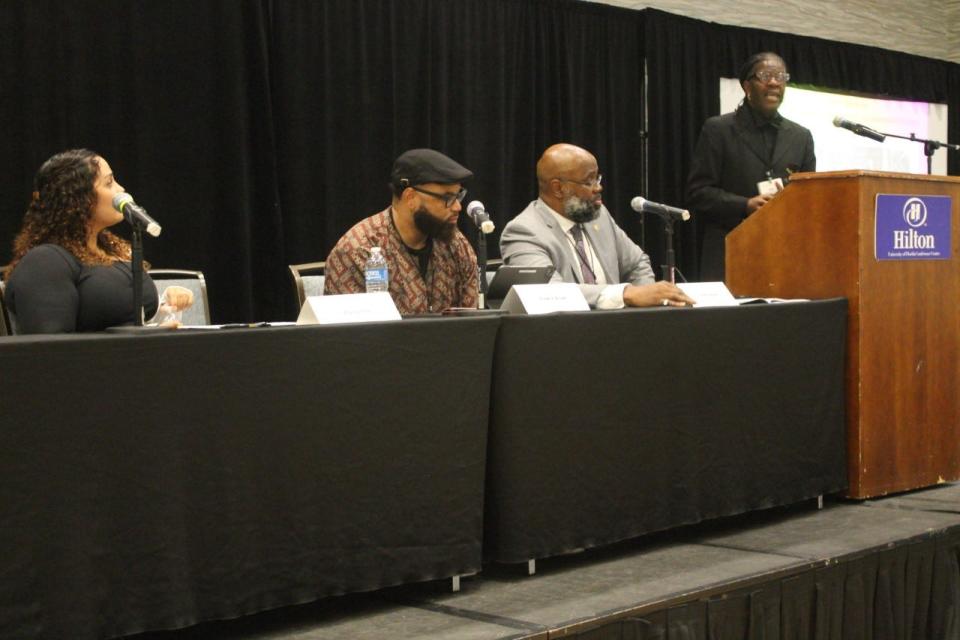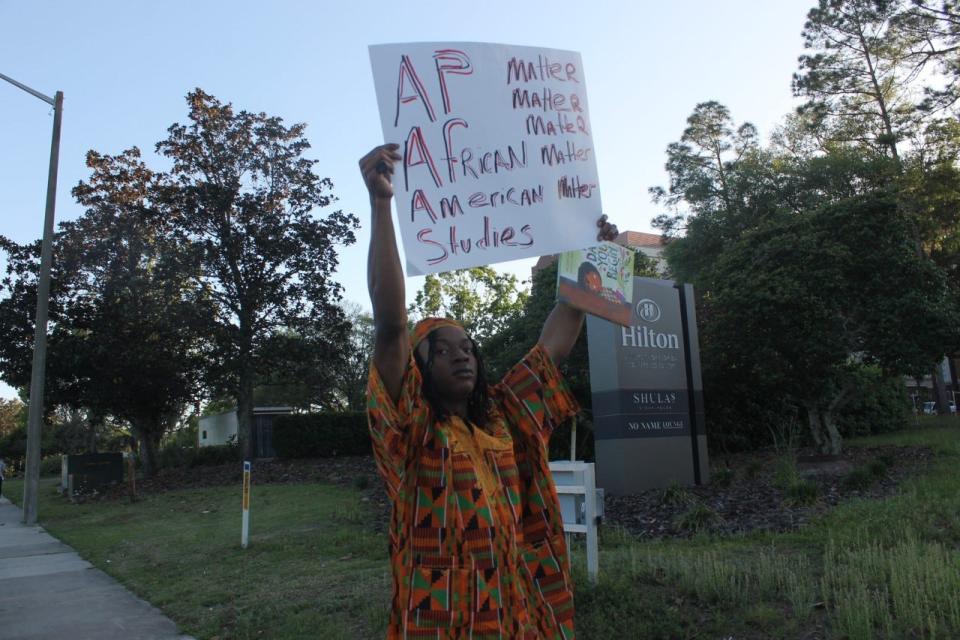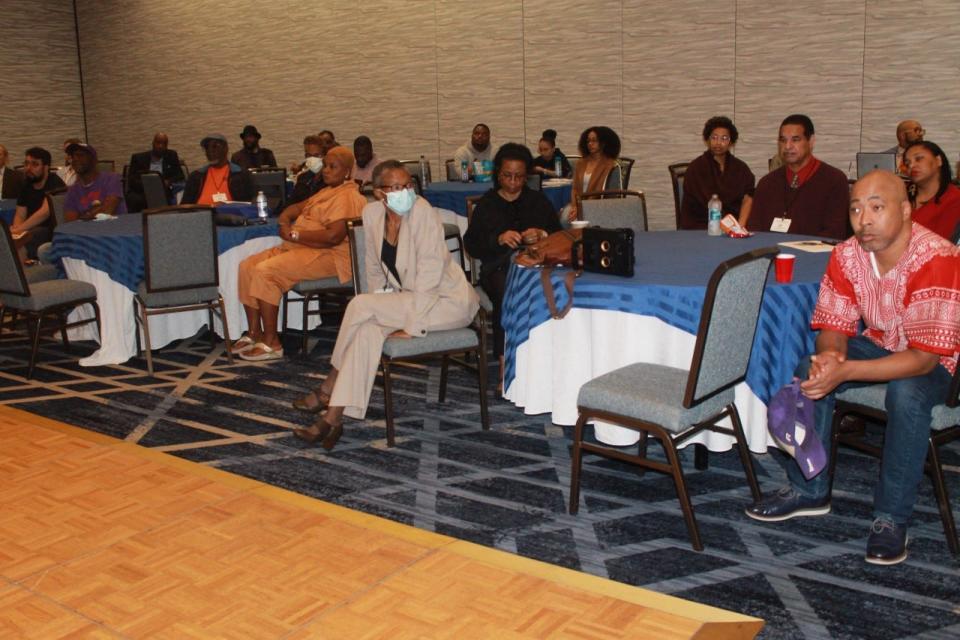'Teaching Black While Living In The Red' discussion draws crowd, engaging dialogue
- Oops!Something went wrong.Please try again later.
Scholars of Black Studies discussed their research to help the African Diaspora move forward collectively as the 47th Annual National Conference for Black Studies came to a conclusion Saturday at the University of Florida Hilton Hotel and Conference Center in Gainesville.
The conference, held Wednesday through Saturday with nearly 100 scheduled sessions, ended with the "Teaching Black While Living In The Red: African-American Studies at the University of Florida" as the final session of the conference that attracted scholars from California to Massachusetts.
Black education:Celebrating Black education
Black conference:Annual national Black Studies conference to be hosted by UF from Wednesday through Saturday
Black history:Libraries honor Hilliard-Nunn during Black History Month
The three panelists at the final session on Saturday were Drew Brown, Ph.D., Alyssa Cole, Ph.D., and Rik Stevenson, Ph.D.
Cole is the Patricia Hilliard Nunn Visiting Professor of African American Studies at UF, and she specializes in 19th and 20th century research that focuses on gender, race, medicine and community histories.
Brown is a leading scholar in the area of race, sports and culture at UF, and is an assistant professor in Africana Studies where he studies a wide range of topics surrounding the culture and existence of African people all over the world.

Stevenson is a professor of African American and African Studies at UF, and specializes in Middle Passage studies, slave ships, mortality scholarship, resistance studies, American slavery during the Antebellum and historical methods that integrate marine and nautical archaeology.

The moderator of the session was David Canton, Ph.D., director of the African American Studies Program at UF.
"This plenary session shows our outstanding scholars and their work," Canton said. "This conference shows how Black studies have been resistant. If it wasn't working, they wouldn't try to get rid of it."
The conference included a rally protesting what some consider to be an attack on Black studies by Florida Gov. Ron DeSantis.

"Our history will not be erased. Education is our future," Amere Wofford shouted at the intersection of Southwest 34th Street and Hull Road Friday evening in front of the UF Hilton Conference Center.
Wofford is a computer information systems sophomore at California State University in Los Angeles, and he values the teaching of Black studies.
"As we come to the conference, it is good to talk about the importance of issues, but we have to let people know we are here and what we are fighting against and to get our voices heard," Wofford said.
He and a dozen protesters held signs and books that were banned in Florida public schools.
The final session on Saturday included a presentation by Brown about Africana studies' methodology in the study of Black sporting culture.
"We need to understand the value of using Africana studies in a powerful practice," Brown said.
Brown talked about how he uses Africana studies to delve deeper into Black sports culture regarding Colin Kaepernick, Deion Sanders and Kyrie Irving.
"Africana studies allows us to take any subject that pushes us more to our freedom," Brown said. "Let Africana studies be the drum and let's put our work and our goal in rhythm."
Cole's presentation was titled "Organizing for Medical Equity: Black Newspapers in the West, 1900-1940."
Cole said newspapers played a pivotal role in the success of Black hospitals in Kansas City, Kansas.
"Nurses, churches and newspapers developed the Black medical profession in the west," Cole said. "Black communities sustained the movement."
Cole talked about the history of two Black newspapers in Kansas City called the Kansas City Call and the Kansas City Sun.
She said both newspapers promoted patronizing Black businesses and encouraged readers to engage in activism.
"The newspapers urged readers to support Black nurses," Cole said. "The journalists believed that the papers would create Black pioneers."
Stevenson's presentation was titled "Jumping Overboard: Suicide by Drowning as a Form of Resistance during the Middle Passage."
Stevenson's research is based on finding the motivation to what made the enslaved jump from slave ships, and to finding the thousands of slave ships that may be in the waters of the Middle Passage, which is commonly known as the route slave ships took to bring enslaved Africans to the shores of North America.
"Africans are very religious people," Stevenson said. "Religion motivates their behavior. Some believe that if they die in the water their spirit will go back to Africa."
Stevenson said the increased swimming ability of Blacks will lead to more Blacks studying the ocean.
"It's important not only to learn how our ancestors resisted on the land, but how they resisted at sea," Stevenson said. "Our governor is trying to prevent us from telling our story and doesn't want us to know how heinous Europeans have been in creating this country."
During the Q&A session, Brown shared his thoughts about peoples' reaction and their selective outrage regarding the censorship of education.
"People need to understand that it's not just a Florida issue," Brown said. "Other states will follow suit. When Critical Race Theory was under attack, nobody said anything, but when gender studies was under attack, everybody started speaking up. Nobody said anything when it was only affecting us."
This article originally appeared on The Gainesville Sun: Conference ends in Gainesville with Blacks urged to keep being proud

